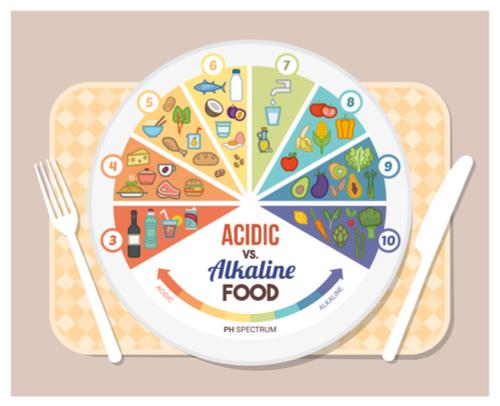Every hour of every day your body is hard at work maintaining a stable blood and tissue pH or acid/alkali balance. This balance affects how our cells survive and thrive, but many things can tip this balance and create the conditions for poor health and serious diseases such as cancer. This month we offer seven simple ways to support a healthy blood pH, to better help you help your body.
Before we dig into those tips, though, here's a quick reminder of why your acid/alkali balance matters.
What is blood pH?
The normal blood pH for humans is around 7.35-7.45, with most of us staying within a range of 7.38-7.41 most of the time. When blood pH is even slightly outside of this range, our bodies struggle to function effectively, and physicians will start to worry if they see such numbers (Pizzorno, 2015). Bigger discrepancies can prove fatal as our blood vessels dilate, our cells stop functioning, we lose consciousness, and our organs begin to fail as basic metabolic processes cannot be carried out. Below 6.9 is coma territory, and at 6.8 or below or 7.8 or higher you won't survive.
This balancing act is quite incredible, and relies on our bodies figuring out exactly how much acid and alkali it needs at any given moment. To maintain this balance, we excrete acid through our breath, sweat, and urine, and our kidneys conserve substances like bicarbonate and other acid buffers. This is part of why acute kidney failure can quickly tip people into acidosis and death, and why low-grade acidosis is more common in older people as their kidney function declines.
The negative effects of low-grade acidosis
Low-grade acidosis is the term used to describe a situation where blood pH is at the low end of normal for a prolonged period. This small decrease in pH can have significant health effects, such as reducing bone mineral density as the body pulls calcium from bones to buffer blood acidity. Low-grade acidosis can also compromise muscle mass, immune function, detoxification and elimination of toxins, and may even increase the risk of cancerous growths and metastasis (spread) of cancerous cells around the body (Pizzorno, 2015).
Thankfully, there are a few things we can do throughout life to support the body's efforts at keeping us within a healthy pH range.
- Bitter is better
Once upon a time, the average person ate a diet rich in foods that taste bitter instead of sweet. As our tastes have changed over the last hundred years or so, our bodies have had to work harder in the absence of these bitter foods. Bitter foods support digestion by enhancing bile production and flow. This, in turn, supports the metabolism of sulfur-containing amino acids (which have an acidogenic effect on the blood), thereby helping your body to maintain an optimal blood pH.
Eating a high level of alkaline-forming foods may help maintain or improve bone mineral density and muscle mass, and could protect against chronic disease including cancer. Try adding bitter foods back into your diet, such as artichoke, radicchio, dandelion, and seaweed, or choose a natural green food supplement that provides a daily shot of these types of plant foods.
- Pick plants!
A full English breakfast is one of the worst things to eat in terms of maintaining a healthy blood and tissue pH. Animal derived foods, especially red meat, tend to contain high levels of sulfur-containing amino acids which can have an acidogenic effect on your blood and tissue pH. Eating these foods can also mean you eat fewer vegetables, fruits, seeds, nuts, legumes, and whole grains that provide potassium and other nutrients your body needs for acid balance. So, skip the meat and dairy and enjoy a predominantly plant-based diet to reduce the risk of calcium being leached from your bones to balance blood pH (Zerwekh et al., 2009).
- Skip the sugar, salt, and soft drinks
The primary dietary sources of acidity are sulfur-containing amino acids (as outlined above), salt, and phosphoric acid, which is found in soft drinks (Pizzorno, 2015). Just as our diets used to be contain more bitter than sugary foods, they were also less salty in general, and certainly didn't feature soft drinks in anything like the amounts currently consumed by the average person.
Together, the salt, sugar, and phosphoric acids make it harder to maintain an optimal blood pH. Give your body a break by skipping the soft drinks and opting for low sodium, low sugar, whole food versions of your favourite foods.
- Monitor your medications
Antacids and antibiotics, among other drugs, can throw your body's acid/alkali balance into turmoil (Pizzorno, 2015). While you certainly shouldn't stop taking any prescribed medications, it's smart to be aware of how these drugs can impact your whole system and to take steps to lessen their negative side effects. That might mean talking to your doctor or natural health practitioner and working out a natural supplement regimen that offers extra support for detoxification and acid balance.
- Take probiotics
There is some evidence that the bacterial balance in our guts affects blood pH. Maintaining a healthy digestive tract to keep undesirable bacteria in check could offer even greater benefits than previously thought. A daily probiotic such as Natren Healthy Trinity helps support a healthy gut microbiome.
- Taking Vitamins and Minerals
Vitamins and minerals offer an easy way to support your body's efforts at homeostasis. Studies show that taking a greenfood powder alongside a mineral-based alkalising supplement can help increase urinary pH and support blood acid/alkali balance (Anton et al., 2013, König et al., 2009).
Alkalising diets and supplements are not a fad, but a symptom of typical Western diets and their negative effects on health. Restoring blood pH can be a great first step to limiting the damage done by acidogenic diets and medications, whilst working towards healthier food choices long-term.
- Breathe!
Every time we exhale we get rid of some acid in the form of carbon dioxide. If we hold our breath, the pH of our blood rapidly falls (i.e. acidity increases), causing our blood vessels to dilate and, eventually, rendering us unconscious. Conversely, hyperventilating causes us to eliminate too much CO2, leading to a rise in blood pH (i.e. increased alkalinity) and we feel lightheaded and may pass out unless we get a handle on our breathing.
Taking time to focus on your breath, maintaining a steady pattern of breathing, can help your body regulate blood and tissue pH for better health all round.
References
Anton, S.D., et al., (2013). Effect of a novel dietary supplement on pH levels of healthy volunteers: a pilot study. J Integr Med, Nov;11(6):384-8.
König, D. et al., (2009). Effect of a supplement rich in alkaline minerals on acid-base balance in humans. Nutr J, Jun 10;8:23.
Mousa, H.A. (2016). Health Effects of Alkaline Diet and Water, Reduction of Digestive-tract Bacterial Load, and Earthing. Altern Ther Health Med, Apr;22 Suppl 1:24-33.
Pizzorno, J. (2015). Acidosis: An Old Idea Validated by New Research.Integrative Medicine: A Clinician’s Journal, 14(1), 8–12.
Zerwekh, J.E., (2009). Biochemical and histological assessment of alkali therapy during high animal protein intake in the rat. Bone, Nov;45(5):1004-9.


